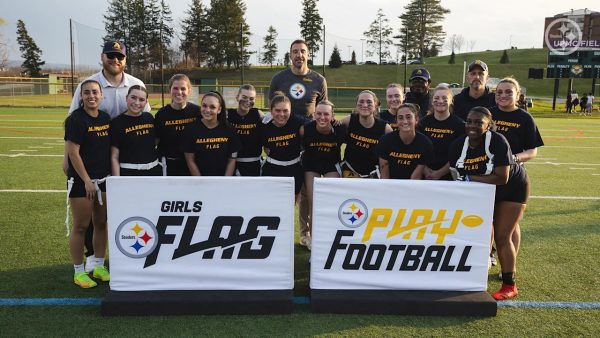Gun violence inspires sustained dialogue club conversation
Allegheny’s Sustained Dialogue held a panel about gun violence on Wednesday, Oct. 25 in the Pelletier Library Collaboratory.
Dr. Harold “Hal” Saunders, an American diplomat who worked in a number of peace processes, founded the national organization in 2002, according to the Sustained Dialogue Institute. Saunders began collaborating with students from his alma mater, Princeton University, to create an organization that talked about issues regarding race relations. Allegheny’s chapter began in 2015.
President Elijah Prince, ’18, opened the panel by explaining the purpose of the organization and why they decided to have a discussion on gun violence.
“The Las Vegas shooting isn’t the first incident that’s ever happened, this is one of many,” Prince said.
Many of the board members of Sustained Dialogue explained that dialogues were meant for having open and non-threatening conversations, which is why the group’s motto is “listening deep enough to be changed by what you hear.”
“Dialoguing is drawing on personal experiences and what you know. This is not debating,” said Sustained Dialogue member Maura McCampbell, ’20. “The last thing we’re here to do is invalidate experiences.”
Before starting the discussion, a “norms list” was written on the wall and attendees were asked to raise their hand and establish rules they wanted to enforce.
“We do this to make sure everyone is on the same page,” board member Brent Temeng, ’18, said.
By the end, the list consisted of five rules. Students were to share stories without giving names, use “I” statements, respect opinions, avoid interrupting people and be careful to not dominating conversations.
Once participants finalized the list, all 40 attendees, plus board members, broke off into three separate groups to create a smaller, more comforting environment. These groups consisted of people from all different backgrounds coming together to discuss individual thoughts and opinions about gun violence. Discussion topics included the events that have occurred across the United States, specifically the Las Vegas shooting on Oct. 1, 2017 and the Orlando shooting on June 12, 2016.
After an hour, the three groups were brought back together to debrief and to see if any aspect of the talk really stood out to them. Many students were surprised by how much everyone’s opinions aligned with one another.
Most agreed that owning small arms was not the problem, it was the lack of policy surrounding firearms usage. Some confessed their confusion about open carry and owning semi-automatic weapons and why it was legal.
As the event came to a close and students began to trickle out to head to other meetings, many commented on how happy they were with the direction the conversations went.
Temeng thought the conversation had gone well in respect to having an open dialogue.
“It wasn’t polarized and it went farther than we had anticipated. I know a lot of people were worried this would turn into a debate,” Temeng said.
Alexis Right, ’20, agreed she had been worried the dialogue would go poorly.
“At first I was worried because I thought this would be intense. Gun violence is a serious issue, but the setting was a lot more relaxing which made it easier to have discussions,” Right said.
Right said she would attend future dialogues to support the organization and to participate in these kinds of conversations.
Prince and Sustained Dialogue member Merryn Spence, ’19, both commented on how quiet many of the students had been but were optimistic that after attending a few more dialogues students would start to speak out more.
“When I first started at Allegheny, I was one of those students,” Spence said. “I was quiet and didn’t talk much and look where I am now. There’s always something to talk about which is the bad part of Sustained Dialogue because that means there’s always something bad happening in the world.”
Prince explained how different boards within Sustained Dialogue get together to decide which topics are talked about. Gun violence has been the most prominent this semester which is why it was selected.
“Meadville is full of such diverse people, if we’re going to have a conversation this is the place,” Spence said.








